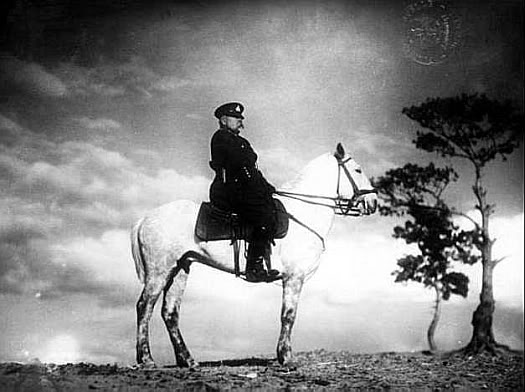Two monuments, of and to the Soviet silent epic. “I must have everything in its true circumstances,” said V.I. Pudovkin about his films, the great innovator of action montage asserting himself some sort of documentarian. But “doesn’t reality have to be worth saving,” suggests Godard slyly in his video-essay The Kids Play Russia, “for us to come to its rescue?” Godard, playing Dostoevsky’s Idiot, surrounded by Russian dolls, hawks the Soviet silent cinema that saw truth and fiction as different ways of seeing the same thing. To prove the point, he sends his DP to Russia, has her film everyday life, and edits to synchronize her movements with his, her hotel’s maids and train rides with each other so that, somehow, juxtaposed, they play out the outlines of Chekhov or Tolstoy. They could be Chekhov’s characters—but that says as much about them as it does about Chekhov’s enduring society.
A video essay, a post-script to Histoire(s) du cinema, The Kids Play Russia reveals Soviet porn and propaganda as potential historical realties and real places and people as items of potential fictions: each, somehow, is an abstracted form of the other, a screen memory to preserve it for posterity. It’s a matter of placing them in context, or montage. No film makes the point more cruelly than Pudovkin’s masterpiece, Storm Over Asia, captured on location in Mongolian markets and festivals. In his action epic of a herdsmen who finds himself heir to Genghis Kahn, inheritor of an empire, and model of a bow-tie, Pudovkin cuts his most spectacular scenes as invocations of nature brewing, and his most intimate as spectacles of moneyed romance.
Reality or fiction? Everyone becomes capital for melodrama and an all-consuming commodity fetish; the story Pudovkin tells “in its true circumstances,” is of the lies lived out by men at the thrust of the stories they tell. When Godard asserts with patent foxiness that the West invades Russia “because it is the home of fiction, and the West doesn’t know what to invent anymore,” he could be talking about the trek of Pudovkin and his imperialists into the wilderness. —David Phelps
Storm Over Asia by Vsevolod Pudovkin
Soviet Union, 1928, 16mm, black and white, silent

“a film of amazing visual hardness, lushness, and vigor, one of the great works of the Soviet avant-garde”—Chris Fujiwara
A Mongolian herdsman fights a capitalist fur trader over cheating profits and finds himself puppet king to British imperialists. If they can’t shoot him, the British conspire as they realize he’s Genghis Khan’s heir, they can determine him as well by decking him out in tuxedos; all that matters is the maintenance of the image. Pudovkin’s final film in his “revolutionary trilogy” tears through its shots in one of the most sophisticated, and captivating displays of manic montage; it’s a film that seems to expose its own foundations more incisively at every beat.
The Kids Play Russia by Jean-Luc Godard
France/Russia, 1993, 60 minutes, digital projection, color and black and white, with subtitles.
One of Godard’s rarest and very best, this essay-thriller-comedy on Soviet films and Russian invasion starts with a film reel punning as a plane’s propeller, watches modern Russia and Soviet films through Godard’s oracular Kino-Eye, and is perhaps his clearest statement of intent that fiction, as he says, is only an arrangement of reality. Or rather that fiction’s in the beholder’s eyes. Film is linked to flying, flying to uprising, uprising to Chekhov’s Seagull, the projection of film to the projection of ideas; Godard scouts for people and motions as potential masses that might have taken shape, in an author’s eyes, as stories. Anna Karenina is filmed in modern-day as a woman walks along the train tracks; Chekhov is acted on a backyard swing-set.
Special thanks to Seagull Films.
 John MacKay is Professor of Slavic Languages and Literatures and Chair of Film Studies at Yale University. He is the author of Inscription and Modernity: From Wordsworth to Mandelstam, Four Russian Serf Narratives, and numerous articles and translations. His book on Dziga Vertov’s life and work is forthcoming from Indiana University Press.
John MacKay is Professor of Slavic Languages and Literatures and Chair of Film Studies at Yale University. He is the author of Inscription and Modernity: From Wordsworth to Mandelstam, Four Russian Serf Narratives, and numerous articles and translations. His book on Dziga Vertov’s life and work is forthcoming from Indiana University Press.
David Phelps is a New York-based film critic for mubi.com; he has contributed to various publications, including Cinema Scope, Film Comment, The L Magazine, BOMB, and Slant, and translated for various sites.









